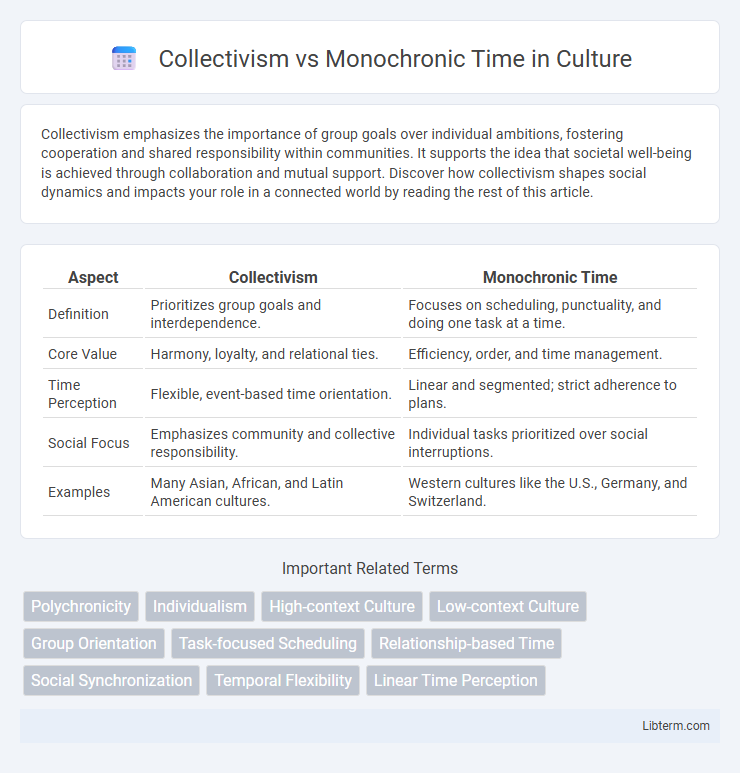Collectivism emphasizes the importance of group goals over individual ambitions, fostering cooperation and shared responsibility within communities. It supports the idea that societal well-being is achieved through collaboration and mutual support. Discover how collectivism shapes social dynamics and impacts your role in a connected world by reading the rest of this article.
Table of Comparison
| Aspect | Collectivism | Monochronic Time |
|---|---|---|
| Definition | Prioritizes group goals and interdependence. | Focuses on scheduling, punctuality, and doing one task at a time. |
| Core Value | Harmony, loyalty, and relational ties. | Efficiency, order, and time management. |
| Time Perception | Flexible, event-based time orientation. | Linear and segmented; strict adherence to plans. |
| Social Focus | Emphasizes community and collective responsibility. | Individual tasks prioritized over social interruptions. |
| Examples | Many Asian, African, and Latin American cultures. | Western cultures like the U.S., Germany, and Switzerland. |
Understanding Collectivism: Core Principles
Collectivism emphasizes group harmony, shared goals, and interdependence, prioritizing community over individual achievements. In collectivist cultures, time is often viewed flexibly, aligning more with polychronic rather than monochronic concepts, where relationships take precedence over strict schedules. Understanding collectivism's core principles involves recognizing the value placed on social cohesion, mutual obligations, and collective well-being.
Monochronic Time: Definition and Characteristics
Monochronic time emphasizes a linear, schedule-driven approach where tasks are handled sequentially, reflecting a strong preference for punctuality and strict adherence to deadlines. This time orientation values efficiency, orderliness, and the completion of one task before moving to the next, minimizing interruptions and multitasking. Cultures with a monochronic time perspective, such as those in the United States and Germany, often prioritize individual appointments and clear time boundaries in both professional and personal environments.
Cultural Roots of Collectivism
Collectivism, deeply rooted in Confucian traditions and communal societies, prioritizes group harmony and interdependence over individual goals, influencing time perception and social interactions. In collectivist cultures, monochronic time, characterized by strict schedules and linear task completion, is often secondary to maintaining relationships and social obligations. This cultural emphasis shapes a flexible approach to time, where punctuality and deadlines are adapted to preserve group cohesion and mutual respect.
Time Perception in Monochronic Societies
Monochronic societies prioritize punctuality and view time as a linear, segmented resource that demands strict scheduling and adherence to deadlines. Time perception in these cultures emphasizes individual tasks completed sequentially, with minimal tolerance for interruptions or multitasking. This focus on precise time management supports efficient workflow but often contrasts with collectivist cultures where relational harmony may override rigid time structures.
Comparing Group Priorities and Time Management
Collectivism emphasizes group priorities, where relationships and community goals take precedence over individual schedules, leading to flexible time management that adapts to social contexts. In contrast, monochronic time systems prioritize strict adherence to schedules and punctuality, valuing task completion and individual time allocation. This fundamental difference shapes how cultures coordinate activities, with collectivist societies favoring fluid time arrangements and monochronic cultures emphasizing efficiency and time discipline.
Workplace Dynamics: Teamwork vs. Schedules
In collectivist cultures, workplace dynamics emphasize teamwork and group harmony, prioritizing collaboration and consensus over strict adherence to schedules. Monochronic time orientations focus on individual task completion and punctuality, valuing precise scheduling and deadlines within professional environments. Balancing collectivism with monochronic time requires organizations to integrate flexible team collaboration while maintaining structured timelines for efficient workflow.
Social Relationships and Time Commitments
Collectivism emphasizes strong social relationships where group harmony and interdependence guide time commitments, often prioritizing flexible schedules to accommodate communal activities. In monochronic time cultures, social interactions are structured around strict schedules and punctuality, valuing individual time management and sequential task completion. Balancing collectivist social obligations with monochronic time demands requires navigating between relational flexibility and adherence to precise time commitments.
Conflict Resolution: Group Harmony vs. Punctuality
In collectivist cultures, conflict resolution prioritizes group harmony and maintaining relationships, often leading to flexible time management to avoid confrontation. Monochronic time cultures emphasize punctuality and schedules, addressing conflicts through direct communication and adherence to deadlines. Balancing group cohesion with strict time norms remains a critical challenge in cross-cultural interactions.
Impacts on Communication Styles
Collectivism emphasizes group harmony and indirect communication, leading individuals to prioritize context and nonverbal cues in interactions, while monochronic time orientation stresses punctuality and clear, sequential communication, encouraging direct and task-focused conversations. In collectivist cultures with monochronic time, communication tends to balance respect for group consensus with strict adherence to schedules and deadlines. This combination impacts workplace dynamics by fostering collaboration that respects time constraints and social harmony.
Adapting Across Cultural Timeframes
Adapting across cultural timeframes requires understanding that collectivist societies often operate on polychronic time, valuing relationships and multitasking over strict schedules, while monochronic cultures emphasize punctuality and sequential task completion. Effective cross-cultural communication involves balancing these preferences by showing flexibility in time management and respecting communal priorities without compromising deadlines. Emphasizing cultural sensitivity and time-awareness enhances collaboration and minimizes misunderstandings in global business and social interactions.
Collectivism Infographic

 libterm.com
libterm.com